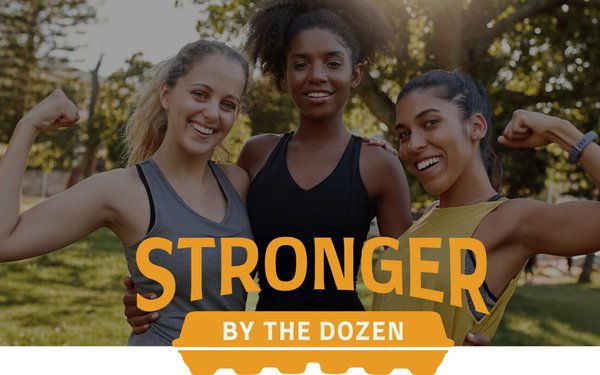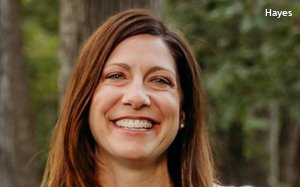
The incredible, edible egg has faced more
than its share of marketing challenges, from being named a sticky cholesterol villain to the fragile barometer of runaway grocery prices. Now the American Egg Board is cracking open a new approach.
With a new “Stronger by the Dozen” marketing campaign, it’s moving to more cohesive messaging, leaning into cultural relevance, digital platforms, and fresher storytelling.
Katie Hayes, director of scientific communications, is helping lead that shift. She tells Marketing Daily how the organization is resetting the narrative
around eggs, countering nutrition misinformation in the age of influencers -- and why eggs still have cultural staying power well beyond the breakfast table.
This interview has been edited
for length and clarity.
advertisement
advertisement
Marketing Daily: Every legacy brand faces baggage. How is the Egg Board reframing its story to feel relevant in 2025?
Katie Hayes: We’re really excited to be uniting all of our nutrition communications
under one clear story, to help consumers understand how eggs support muscle and brain health and overall wellness. It’s a pivotal campaign for us and has been years in the making.
We’ve really turned the page on cholesterol and heart health. And this new effort is driven by strong insights into nutrition and health priorities that consumers care about most. It
positions eggs as a nutritious everyday food that supports overall well-being.
Marketing Daily: Cholesterol dogged the category for
decades. What’s changed -- and how do you move forward without looking back?
Hayes: We’ve
made significant strides in improving perceptions of eggs by sharing the science, the dietary guidance, and the fact that eggs are officially recognized as healthy by the FDA. “Stronger by the
Dozen” is the next step in that journey -- a bold new direction that connects eggs with a strong body and a strong mind.
Marketing Daily:Still, the American Heart Association and many nutrition experts say it is safe to eat one egg per day, and up to seven per week, implying that more than that is unsafe. Why?
Hayes: They don’t have a specific reason or give a cholesterol limit. The emphasis from them, and from the FDA, is that eggs are a part of a healthy diet.
Marketing Daily: In the last few years, eggs have been painted as the poster child for runaway food inflation. Does this campaign aim to combat that?
Hayes: Eggs are a good value among high-quality proteins. Now, more than ever, people want the most nutritious thing that they can get for their dollar. Eggs are a complete
protein, and this is a moment when consumers are eager for more protein. Eggs are versatile and convenient. And they are nutrient-rich, beyond protein.
Marketing
Daily: Is there an age when consumers are particularly likely to add more eggs to their diet?
Hayes: Eggs are good for all ages, from during pregnancy to
feeding young kids. New research has linked eggs to a reduced risk of developing Alzheimer's dementia, a relationship driven by dietary choline.*
Marketing
Daily:What’s changed about the way people find and consume nutrition information?
Hayes:We’ve always
taken a data-driven approach, so we have had a lot of conversations with people to find out what's important to them when it comes to health and the role of food and nutrition in their lives.
We’ve learned that the way people think about health has evolved. They’re not just thinking about how to prevent illness. They're looking at health as kind of this journey toward overall
well-being, and it’s highly personal.
Each person's journey looks a little different, but a clear pattern emerged, with four pillars: physical health, mental or brain health, social and
emotional well-being. And we kept hearing that they really needed to feel strong. This campaign focuses on how eggs can strengthen them in all four pillars in simple ways. For example, eggs are rich
in choline, which supports brain development, memory and mood – 90% of Americans don’t get enough.

Marketing Daily:Social media has been
both a friend and an enemy to nutrition sciences. Some of what ricochets around FoodTok is downright dangerous. Is that why this new effort leans so heavily on influencers to fight misinformation?
Hayes: Misinformation is one of the biggest challenges in health communication. That’s why we rely on registered dietitians and health
professionals, but we’re also working with influencers who can bring the science into everyday conversations. We’ve chosen people who already communicate this way.
Marketing Daily:How else does the campaign address changing food culture?
Hayes: We're focused on a
fully integrated program, including digital, social, earned and paid. We're even working with some retail dietitians later in the year to do some activations in stores. We want credible information to
reach consumers anywhere they’re looking for ideas.
Marketing Daily: You’ve also launched a new digital hub. Is that just a library, or is it meant to drive deeper
engagement?
Hayes: It serves multiple audiences. For consumers, there are recipes, nutrition
information, and practical content. For health professionals, it’s evidence-based resources they can use in their work. The goal is to keep the core message consistent.
*Editor’s
Note: The original version of this article incorrectly characterized the role of eggs in connection with Alzheimer's disease.